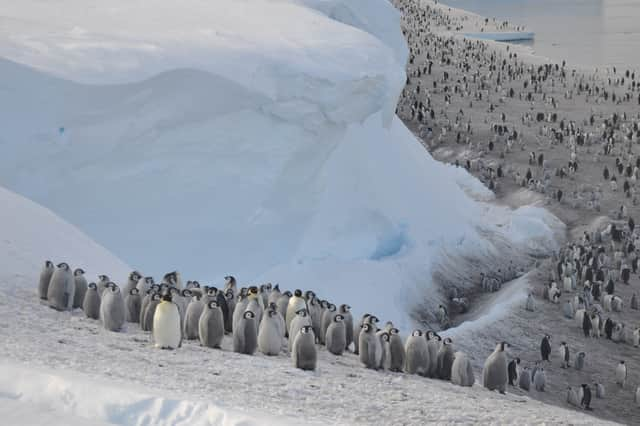World Penguin Day: Antarctica's emperor penguin population could fall 99% by end of century, study warns
and live on Freeview channel 276
If greenhouse gas emissions continue to rise at currents levels, scientists believe emperor penguins will be functionally extinct by the end of this century.
Thursday (25 April) marks World Penguin Day, but a British Antarctic Survey (BAS) study released to mark the occasion shows one of the bird’s most iconic species may be edging closer to the brink. Last year saw Antarctic sea ice levels fall to record lows, researchers found, leading to breeding failures in a fifth of the continent’s emperor penguin colonies.
Advertisement
Hide AdAdvertisement
Hide AdFourteen of the 66 known colonies were impacted, equating to tens of thousands of penguins - the second worse year since observations began in 2018. The devastating results, however, were not as severe as the 2022 breeding season, which saw 19 colonies (nearly 30%) fail.
BAS researchers say there is an increasing trend of colonies losing many, sometimes all, of their chicks when the land-fast sea ice they raise them on breaks up before the youngsters have grown their waterproof feathers. This means they are exposed to Antarctica’s frigid waters without any protection, quickly killing the young birds.


Study author, BAS geographic information author Dr Peter Fretwell, studies the birds from space, using satellite data. “As the continent warms we are seeing the ice break out earlier, leading to higher chick mortality. With fewer chicks surviving at many colonies, it is likely that over time a number of current breeding sites will become untenable, and the overall population will decline.
“This is a future that our climate models predict,” he added. Current predictions - in scenarios where the world’s greenhouse gas emissions continue to rise at their current level - would see emperor penguin numbers fall 99% by 2100, making the planet’s southernmost breeding penguins virtually extinct.
Advertisement
Hide AdAdvertisement
Hide AdHowever, researchers have noticed that some of the colonies badly effected in 2022 are starting to adapt, moving to more stable icebergs and ice shelves to breed. “The fact that we are seeing these adaptations in the worst affected colonies gives us some hope that the birds can react to their changing environment and move to find more stable ice,” Dr Fretwell said.
“It also seems that overall sea-ice concentration levels do not always translate to early fast ice break-up at the colonies, with more subtle regional factors, such as the persistence of El Niño and La Niña cycles also play an important part.”
Last year was the world’s hottest year on record, but experts are already warning 2024 may be even hotter. A persisting El Niño weather pattern was one contibuting factor, but so too were rising greenhouse gas emissions, which combined to create an extra warming effect on the atmosphere and oceans. Scientists have been urging the global community to radically cut these emissions to prevent further warming, with each fraction of a degree further destabilising the Earth’s climate.
To celebrate World Penguin Day, the British Antarctic Survey has released a new map of emperor penguin colony locations for 2023 for Google Earth. You can check it out here.
Advertisement
Hide AdAdvertisement
Hide AdAmber Allott is NationalWorld’s environment and sustainability specialist, covering all things green - from climate to conservation. If you liked this article you can follow Amber on X (Twitter) here and sign up for the free daily NationalWorld Today newsletter here - with Amber bringing you the UK's most important, pressing, weird and wonderful environmental stories every Tuesday.
Comment Guidelines
National World encourages reader discussion on our stories. User feedback, insights and back-and-forth exchanges add a rich layer of context to reporting. Please review our Community Guidelines before commenting.
